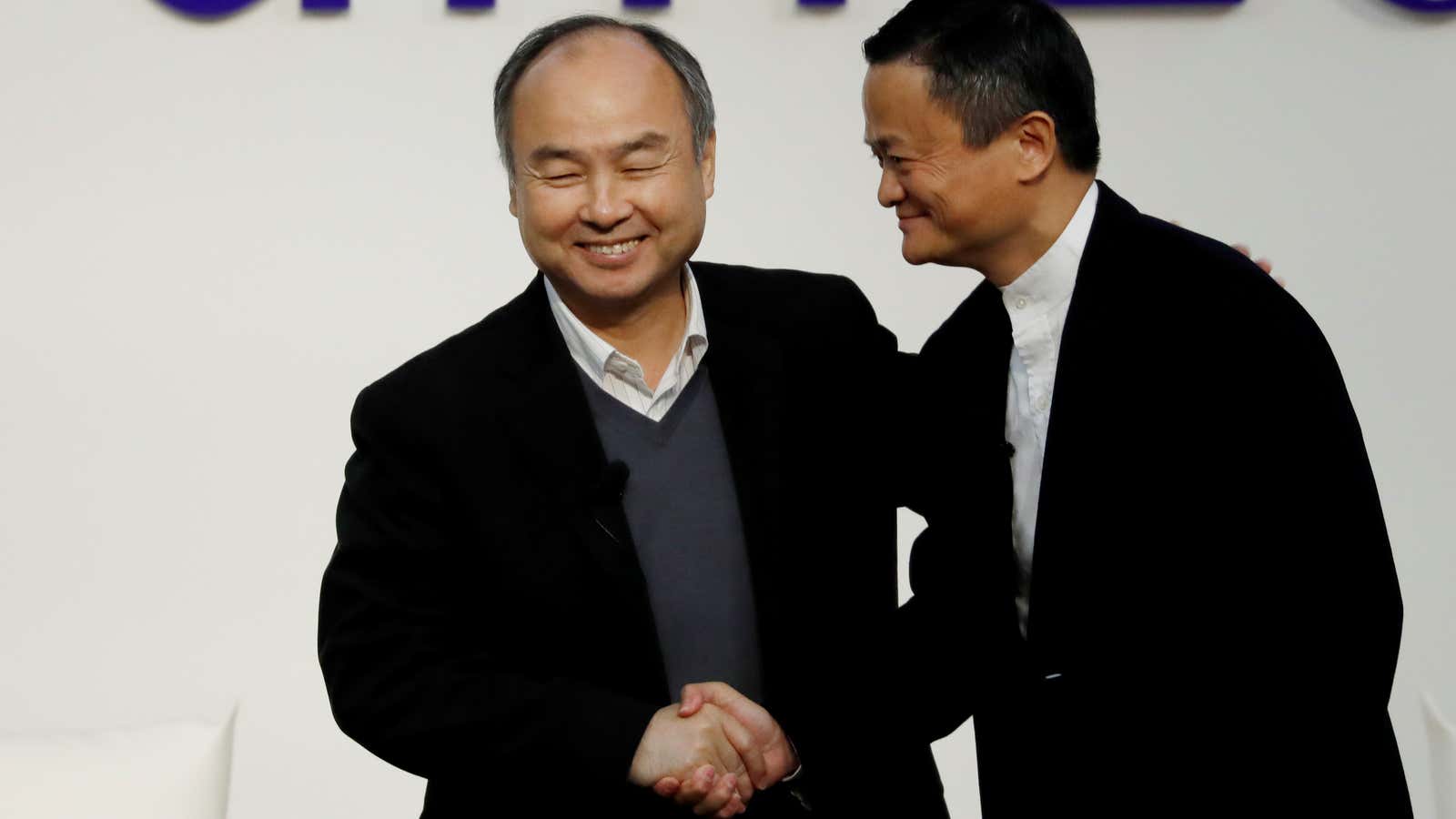Two of the world’s most powerful tech tycoons are parting ways.
Masayoshi Son, the founder and CEO of Japan’s SoftBank Group, announced today (June 25) at the firm’s annual investor meeting that he has stepped down from Alibaba’s board, which he joined as a director in 2005. Son’s departure coincided with Alibaba founder Jack Ma’s own departure from SoftBank’s board after 13 years. Son said he made the decision “on good terms” and that there was no fallout between him and Ma, who announced he was resigning as a SoftBank director last month, though it took effect today. At that time, Son said that he and Ma will remain friends “for the rest of our life.”
“We would like to give our sincere thanks to Masayoshi Son, who gave Alibaba and our founding team entrepreneurial inspiration over the last 20 years. SoftBank is our longest-tenured institutional shareholder, and we appreciate their continued support of our company and management team,” said an Alibaba spokesperson. SoftBank did not reply to a request for comment.
The relationship between Asia’s most famous tech entrepreneur and its most famous tech investor began when Son invested $20 million in Alibaba in 2000 after a short chat with Ma, when the Chinese e-commerce firm was just a year old. Alibaba then transformed from a company founded out of a small flat to a retail-and-logistics behemoth that has a market capitalization of over $600 billion. SoftBank remains Alibaba’s largest single investor with an around 26% stake in the company, which is lauded as the Japanese firm’s most successful investment ever.
That bet cemented Son’s reputation as a tech investor with a golden touch, paving the way for him to build SoftBank’s $100 billion Vision Fund. Alibaba and SoftBank, in turn, often partnered to invest in late-stage startups in Asia and elsewhere.
The partnership between the two men spanned a remarkable time for global tech, two decades where boundless optimism saw enormous amounts of capital scouring the globe for the next breakout startup. Another emblematic investment of that time: South African media firm Naspers’ 2001 bet on social media giant Tencent.
The “divorce” between Son and Ma comes as that golden age seems to be giving way to a more frugal and divided one—and as the Japanese investor’s strategy has faced increasing criticism. Once high-flying unicorns, including SoftBank-backed Uber and WeWork, have faltered after lackluster IPOs and sharp cuts to valuations after investors lost faith these firms could become profitable. The rising geopolitical tensions between China and the US are also increasingly curtailing the flow of capital, talent and cooperation between tech companies globally, while the coronavirus outbreak, which has stalled the world’s economy, exacerbated the pain for many tech startups and their investors.
SoftBank reported its first annual loss in 15 years for it financial year ended in March. It registered an operating loss of 1.36 trillion yen ($12.7 billion), compared with $19.6 billion in profit for the previous year. In addition to the disappointing performance of Uber and the failed IPO and meltdown of WeWork, Indian budget hotel chain Oyo, once seen as SoftBank’s new crown jewel, isn’t faring well, and has little hope of recovery with the virus bringing tourism to a halt.
Son nevertheless sounded an optimistic note today. Even as it sells some Alibaba shares (paywall), the Japanese firm will retain a large stake in Alibaba and Son told investors he’s confident there are one or two “mini-Alibabas” in the firm’s current portfolio, which includes a stake in China’s ByteDance, the world’s most valuable private tech firm with a valuation over $100 billion.
